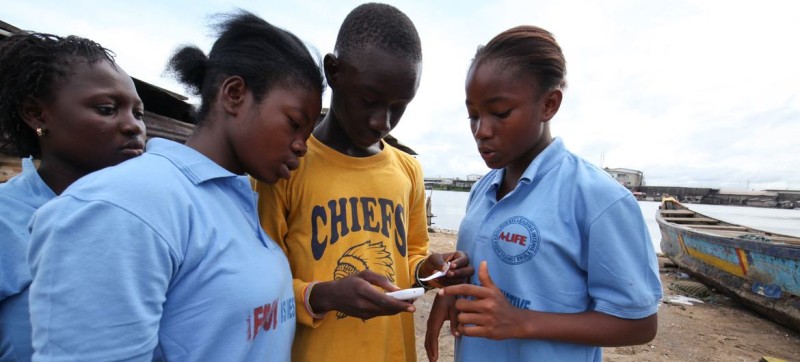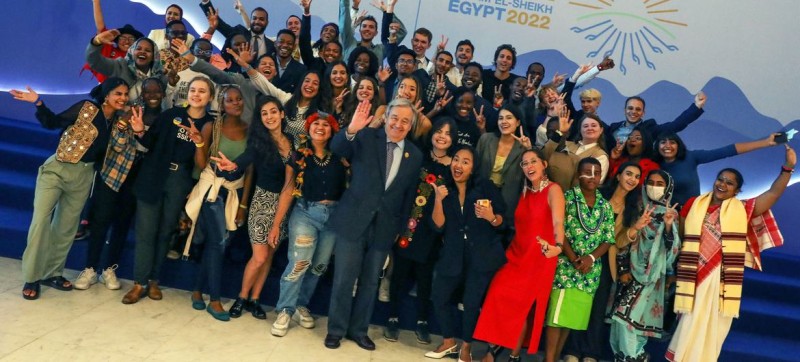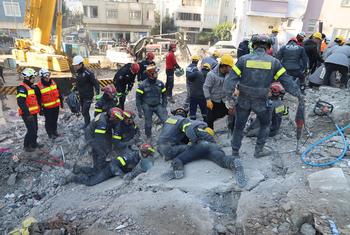
© UNICEF/Ahmad Jallanzo Young people in Monrovia, Liberia, share mobile technology designed to raise awareness about Ebola.
The report calls for expanding and strengthening youth participation in public policy making and decision-making at all levels, to realize the promise of the 2030 Agenda for Sustainable Development.
A ‘driving force’ for change
The UN chief emphasized that youth are key to identifying new solutions for the breakthroughs that the world urgently needs.
Tweet URL
“Young people have become a driving force for societal change through social mobilization – pushing for climate action, seeking racial justice, promoting gender equality and demanding dignity for all,” he said.
“By advocating for their active inclusion in policy spaces, young people provide diverse perspectives that improve and inform critical decisions.”
Struggling to be seen
Despite their numbers, young people remain almost invisible when it comes to participating in public policy making and decision-making, according to the report.
“This is evident at the national level, where mechanisms such as youth parliaments or youth councils struggle to make an impact on decisions being taken at the cabinet table, votes on domestic budgets, compromises in a peace process or agreements on a just transition,” the report said.
“The same is true in the multilateral sphere, where, despite the emergence of a patchwork of youth engagement opportunities, youth continue to exert little influence over decision-making around sustainable development, the maintenance of peace and security and human rights.”
Filling the gaps
The report highlights existing gaps and shortcomings and recommends action to fill the gaps.
Unless they are addressed, “youth engagement in decision-making at all levels will remain of mixed quality and the capacity of governments, public institutions and multilateral institutions – including the United Nations – to understand and respond to youth concerns will remain severely hampered,” the report warned.
The Secretary-General stressed that the UN system has a critical role to play in supporting young people to be adequately prepared to participate in decision-making at all levels.
“If the multilateral system is to be fit to deliver a present and future that works for all, then meaningful youth engagement must become the norm rather than the exception,” he said.
Setting the standard
In addition to expanding and strengthening youth participation, the report calls for endorsing a global standard for meaningful youth engagement in decision-making.
Over the years, Governments, youth organizations and UN entities have developed a series of core principles to ensure meaningful youth engagement, including that it should be rights-based, adequately resourced, transparent, and accessible, particularly for young people with disabilities.
Other recommendations call for establishing a national youth consultative body in every country and making meaningful youth engagement a requirement in all UN decision-making processes.
The report also advocates for ensuring the “systematic integration of meaningful youth participation into all UN intergovernmental mechanisms” and adopting clear arrangements for youth engagement across the work of the General Assembly.
It outlines more steps the UN should take, including reviewing the working methods of the Security Council and its relevant subsidiary bodies in relation to youth engagement, and creating a first-ever UN Youth Townhall to ensure more representative youth participation.

UNFCCC/Kiara Worth Secretary-General António Guterres with young climate activists at the Climate Implementation Summit at COP27 in Sharm el-Sheikh, Egypt.
A ‘game changer’ at the UN
The policy brief is the latest input by the Secretary-General ahead of next year’s Summit of the Future, where countries will examine common solutions for a better world, strengthening global governance for current and future generations.
It is the third report in a series building on proposals contained in his Our Common Agenda report, published in 2021.
In a post on her official Twitter account, the Secretary-General’s Envoy on Youth, Jayathma Wickramanayake, described the policy brief as a “game changer” for ensuring meaningful youth participation at the UN.
The proposals contained in the brief draw on consultations with UN Member States and relevant stakeholders, including through two “MY World” surveys in which more than 10 million young people from 194 countries voted on issues that matter most to them.
“More than ever before, we see massive momentum on the youth front here at the UN and elsewhere – and this policy brief presents another big opportunity for us to take historic strides forward in opening up more spaces for youth participation at all levels,” Ms. Wickramanayake said in a video message.

Türkiye-Syria Earthquake
DONATE!
Emergency and search-and-rescue teams have deployed to assess and prioritize urgent needs and to provide life-saving assistance following the devastating earthquake near the Türkiye-Syria border.

